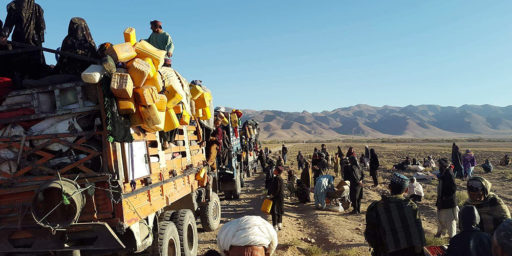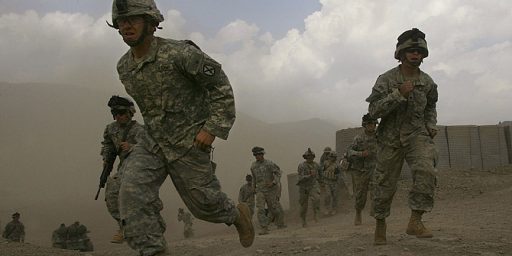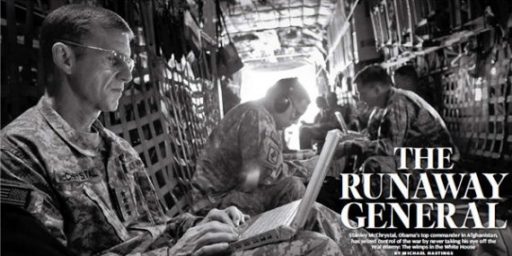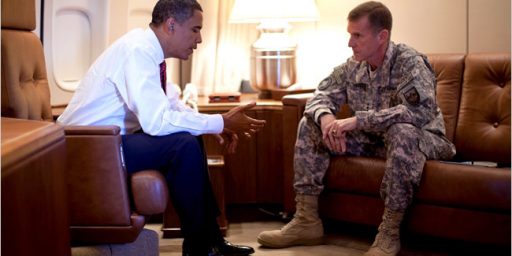Please Make a Case for Afghanistan
I haven’t commented on Afghanistan for the last few weeks, partly to allow the debate to coalesce, partly because I’d said my piece. However, two items, an op-ed from Anthony Cordesman in the Washington Post and an item from The Guardian on Gen. McChrystal’s long-awaited review of the situation in Afghanistan, have moved me to comment again.
In his op-ed Dr. Cordesman urges additional troops, money, and time for Afghanistan:
I do not know what resources Eikenberry or McChrystal would seek if given the chance. Eikenberry has indicated that funding of the civil side of the U.S. Embassy effort in Afghanistan is about half of what is necessary: Some $2.1 billion more may be sought to meet a $4.8 billion total need. He will almost certainly need far more civilians than the token “surge” that is planned (and that will not produce its full results until the spring or summer of 2010).
McChrystal has not announced a need for more U.S. troops, but almost every expert on the scene has talked about figures equivalent to three to eight more brigade combat teams — with nominal manning levels that could range from 2,300 to 5,000 personnel each — although much of that manpower will go to developing Afghan forces that must nearly double in size, become full partners rather than tools, and slowly take over from U.S. and NATO forces. Similarly, a significant number of such U.S. reinforcements will have to assist in providing a mix of capabilities in security, governance, rule of law and aid. U.S. forces need to “hold” and keep the Afghan population secure, and “build” enough secure local governance and economic activity to give Afghans reason to trust their government and allied forces. They must build the provincial, district and local government capabilities that the Kabul government cannot and will not build for them. No outcome of the recent presidential election can make up for the critical flaws in a grossly overcentralized government that is corrupt, is often a tool of power brokers and narco-traffickers, and lacks basic capacity in virtually every ministry.
In Dr. Cordesman’s view a commitment of years, billions more, and as many 40,000 more troops may accomplish victory; failure to make such a commitment will result in defeat:
We have a reasonable chance of victory if we properly outfit and empower our new team in Afghanistan; we face certain defeat if we do not.
Gen. McChrystal reiterates his support for a counter-insurgency strategy in Afghanistan:
The west must change its strategy in order to prevail in Afghanistan, the top US commander in the country said today as he handed over to US and Nato commanders a sweeping review of operations that may lead to a demand for more troops.
“The situation in Afghanistan is serious, but success is achievable and demands a revised implementation strategy, commitment and resolve, and increased unity of effort,” General Stanley McChrystal said. His findings will be submitted to President Barack Obama, who faces a public increasingly restive over a war that has lasted eight years.
Key components of a counter-insurgency strategy include protecting the civilian population, supporting the central government, and reducing insurgent forces. David Kilcullen adds:
Another leading counter-insurgency expert said Afghanistan’s government must fight corruption and deliver services to Afghans quickly, because Taliban militants were filling gaps and winning support. The Taliban were already running courts, hospitals and even an ombudsman in parallel to the government, making a real difference to local people, said David Kilcullen, a senior adviser to McChrystal.
“A government that is losing to a counter-insurgency isn’t being outfought, it is being out-governed. And that’s what’s happening in Afghanistan,” Kilcullen told Australia’s National Press Club.
As I see it there are fundamental problems with a counter-insurgency strategy in Afghanistan. First, as long as the insurgents are able to flee to bases in Pakistan they will be difficult if not impossible to reduce and the Pakistani government despite brave talk has shown little inclination to eliminate these bases.
Second, there is no central government in Afghanistan to support. There is a Kabul government.
Third, there are no prospects whatever for Afghanistan itself shouldering the bulk of the burden of the counter-insurgency effort for the foreseeable future and our NATO allies have shown little enthusiasm for increasing their own commitments to the effort.
But most importantly the case has yet to be made to the American people that victory in Afghanistan is either achievable or even worth pursuing at least not in the time or at the cost that would be required. Commenters as diverse as Matthew Yglesias and Dennis the Peasant have pointed out that neither Dr. Cordeman nor Gen. McChrystal nor the Obama Administration have defined victory in Afghanistan. It’s darned hard to convince people that something is worth sacrificing for if neither you nor they know what it is. I suspect the American people are increasingly skeptical that what’s going on in Afghanistan is the war they signed on for.
MY makes a good point in that binary choices—victory or defeat, maximizing our force or withdrawing—don’t exhaust the possibilities in Afghanistan:
His [ed. Cordesman’s] failure to do so is part of the annoying trend toward defining Afghanistan strategy debates in incredibly stark, binary terms. Either we need to commit maxim resources to a maximalist strategy, or else we’re going to admit “defeat” and cut and run. Realistically, though, there’s a broad middle ground of options between “eliminate all US support for Afghan government and let the Taliban run amok” and “engage in decades-long effort to remark all of Afghan politics and society.”
That withdrawing our forces after having campaigned on advancing the war in Afghanistan could be politically embarrassing to the Obama Administration isn’t enough to justify either increasing the commitment there or withdrawing. What I’d like to see from the Obama Administration is a clear, unambiguous, straightforward declaration of its intentions with respect to Afghanistan. I want President Obama to make his case and I’ll give it a fair hearing. I think the American people deserve as much.






This blog post answers its own question: there is no case for Afghanistan! Bush tried to make the case for Iraq, that we were “building democracy” and “spreading freedom” there. Obama has less of a tendency for such rhetorical hyperbole (at least when it comes to foreign policy) but his recent endorsement of the sham election indicate either severe naivete or intentional deception.
Either way, the American people shouldn’t have to wait for our leaders to make a case for folly. Just like in Iraq, for every “bad guy” that we kill we are supporting another criminal thug, all while living in denial of our inability to pay for these adventures.
It might be feasible to saturate the provinces surrounding Kabul with enough troop power to provide security, government functions, and a gleaning out of Talibanistas. It might be possible to ensure a safe passage through Pakistan to the Provinces for logistics support. All of this might be done with the level of troops we now have there. But, I have come to believe that we have taken on far too much in Afghanistan, and should look for a simplification that has a chance to succeed.
Given a stable and relatively peaceful core, it might be possible to advance control one province at a time, until the majority of them are in the system. I would give that another 8 to 10 years.
Back when I was blogging I wrote a post called “did we just lose a war?” at the point where the Pakistani government made clear that is was striking deals with the tribes as opposed to attempting control of its own borders.
I argued — and I suspect you’d agree, Dave — that’s it’s pretty hard to win a war when you essentially grant your enemy a sanctuary and thus the capacity to control the initiative.
Now the Paks are showing at least some inclination to actually fight extreme elements. God only knows whether this will have any effect. But wouldn’t a withdrawal of US forces from Afghanistan free up Afghan Taliban and Al Qaeda elements to join the Pakistani Taliban’s fights against the Pak government?
As you point out, Pakistan matters. A lot.
The question I’d have is whether our continued presence in Af provides some benefit to the Pak government forces. Or whether it actually makes things harder for Pakistan.
Maj. Kotkin’s paper was pretty good on this IMO. (Via SWJ) He does fail to address the India/Pakistan dilemma very well.
http://smallwarsjournal.com/blog/journal/docs-temp/287-kotkin.pdf
Steve
Steve: What India/Pakistan dilemma? Not the wacky Lindholm/Foust nuclear war thesis I hope. I happen to put up a post just now on that issue: http://www.bernardfinel.com/?p=584.
The problem with Cordesman is — no definition of what our strategic goal is… vague worries about a “defeat” without any serious assessment of the consequences. When I read these essays, I wonder if these guys have just not thought about what “victory” means or whether they just think we’re too dumb to understand their arguments.
Either way, I doubt Obama can make a compelling case to the public if some of the big brains behind the policy can’t do so even to a policy audience.
I agree with manning, a piecemeal approach may be better military wise. Not that there shouldn’t be operations in other provinces as we build up the core provinces. It is a mistake to believe that we must maintain control of an area once we go in. However we need to be careful to continue to make expansion progress and not get too comfortable with just taking ground then leaving all the time. The trick is finding a good balance and knowing when to use finesse and when to use brute force. Problem is too many want to play checkers in a chess game. To them it finesse or brute force all the time and none of the other.
Politically I’m not sure we will have the will to do it.
Obama is half right. We need to focus not on al Qaeda, but on the conditions that make al Qaeda possible, the miserable relations between the West in general & the US in particular with the Muslim world. From that viewpoint, Afghanistan is very important, not for victory, but for demonstration of how the US relates to Muslim populations, how reliable it is as an ally, and what sort of an alternative it can offer to al Qaeda. That’s how to combat al Qaeda.
We must minimize the resource requirement, especially the lives of troops and civilians, to concentrate our efforts in the north and west where we can indeed provide security and spur real development. Cede Helmand and Kahndahar to the Taliban for now, pick away at them, and provide a stark alternative to their 12th century medievalism. Nation-building does not distract us from combating al Qaeda, it IS the central element in our struggle against fundamentalist Islam in general and al Qaeda in particular.
We need to minimize our losses and maximize our gains, show casing everything we can to the American people and the entire world.
Please see my commentary on Afghanistan in Context.